Green Poop in Babies: Causes, When to Worry, and What Parents Should Know
By Dr. Anmol Batra +2 more

Get,

to manage your symptom
Get your,


4 Cr+ families
benefitted

OTP sent to 9988776655



You’ve successfully subscribed to receive
doctor-approved tips on
Whatsapp

Get ready to feel your best.

Hi There,
Download the PharmEasy App now!!


Register to Avail the Offer
Send OTPBy continuing, you agree with our Privacy Policy and Terms and Conditions

Hi There,
Sign up on PharmEasy now!!
Trusted by 4 crore+ families

OTP sent to 9988776655



You have unlocked 25% off on medicines




Code: NU25
By Dr. Anmol Batra +2 more
Table of Contents
During the first few months of life, babies go through rapid changes in feeding and digestion, affecting their stool pattern and colour.
While yellow or light brown stool is most common, green coloured poop may also occur. A large study following over 1,000 healthy infants found that nearly half experienced green-coloured stools at some point within the first 17 weeks, regardless of whether they were breastfed or formula-fed1.
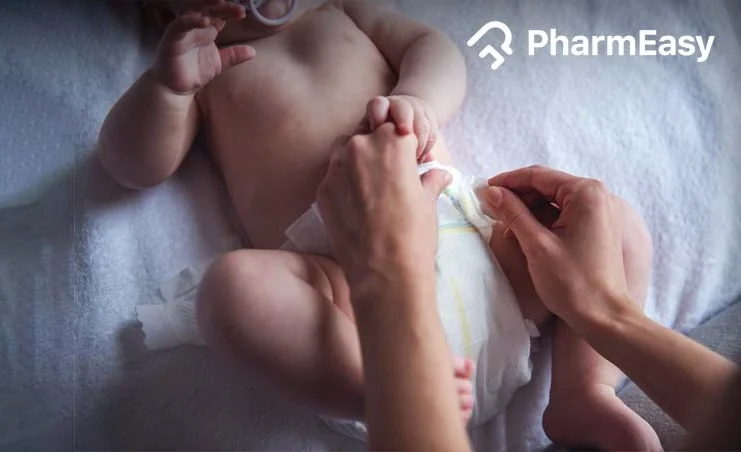
Often temporary, green poop is usually linked to normal variations in bowel frequency and digestion. For parents, however, the sudden sight of green stools in infants can be concerning. Therefore, understanding what is typical and when it may indicate an issue can help reduce unnecessary worry and guide timely consultation with a doctor.
Most of the time, your child’s poop will be a familiar shade of brown, which signals healthy digestion. But poop that looks very different in colour can sometimes be a cause for concern. For example, red streaks on toilet paper may simply come from wiping too hard, a small tear, or vaginal bleed in early life, but red-coloured stool itself could point to issues such as intussusception or internal bleeding that need medical attention.
In babies, however, stool colour can change a lot as they grow. In the first week of life, it often starts off dark green-black and sticky, then turns greener, and later shifts toward yellow, orange, or brown as breast milk or formula feeding continues2.
Green baby poop is common in babies and usually associated with feeding and digestive changes. While usually it is nothing to worry about, it’s important to note if the green poop is associated with any other symptoms. A green- coloured poop with good weight gain of infant is typically considered normal. Although, a green poop with fever or vomiting may suggest a gastro-intestinal infection (mostly parasites), while that with blood and mucus is indicative of protein allergies (Cow Milk Protein allergies)3.
However, these issues may become more prominent as the baby grows and usually in newborns, green poop may be considered normal. At this stage, what parents should watch for instead are pale, white, grey, or very light-yellow stools (especially in a baby with jaundice), which do require prompt medical advice.
Seeing green baby poop can be surprising, but in most cases, it is perfectly normal. Babies’ stools go through many colour changes in the first few months of life as their digestive system develops and as feeding patterns shift. While brown and yellow shades are most common, green stools often occur and are usually harmless3. Some common causes include:
As per my experience, a specific red flag I would suggest parents of newborns to watch for is “Hunger Stool”; if a baby is still passing dark green, scanty stools beyond day 5 of life without transitioning to mustard-yellow, this often signals insufficient milk transfer and dehydration rather than merely a digestion issue6.
Dr. Sarthak Soni, MBBS, MD (Pediatrics)
Green poop can vary depending on age, diet, and digestive development. Therefore, understanding how green stools typically present in different age groups can help parents and caregivers know when it is harmless and when medical advice may be needed.
For older infants, remember one important clinical clue that ‘Green means Speed’: since green is the natural color of bile that hasn’t had time to turn brown, a green stool in a happy, thriving baby is almost always a sign of benign rapid gut transit rather than infection9.
Dr. Sarthak Soni, MBBS, MD (Pediatrics)
Most of the time, green baby poop is harmless and does not require treatment. However, you should consult a doctor if your child has:
Note: Treatment, if needed, will depend on the underlying cause, such as an infection, digestive issue, or dietary adjustment.
Parents often wonder how to stop green poop in babies and maintain normal stool colour.
So, let us have a look at some home remedies that can help support healthy digestion and reduce green stools naturally:

Wash hands properly. Ensure to use clean utensils and properly sterilised feeding bottles8.
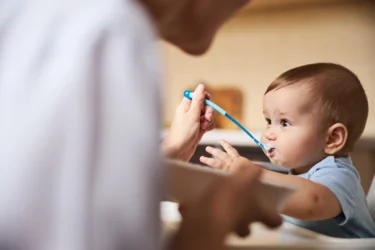
For breastfed babies, ensure a proper balance of foremilk and hindmilk during feeds. For formula-fed infants, follow recommended preparation guidelines.
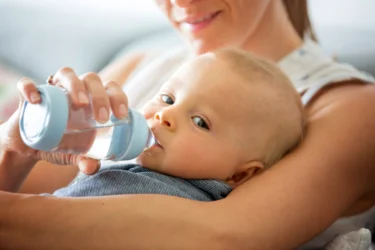
Adequate fluid intake helps digestion and keeps stools soft. This may help reduce changes in colour due to rapid transit.
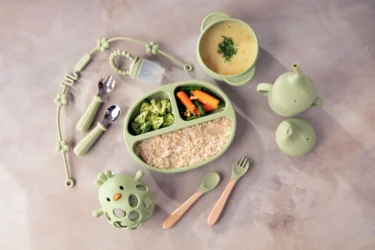
When starting solids, introduce new foods one at a time and continue the same food for at least 2-3 days to observe any effects on stool colour and digestive comfort.
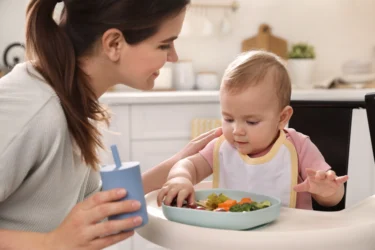
Include a mix of fruits, vegetables, and whole grains in your child’s diet as they grow. Make sure to avoid excessive amounts of foods that could turn stools green, like spinach or iron-fortified cereals.
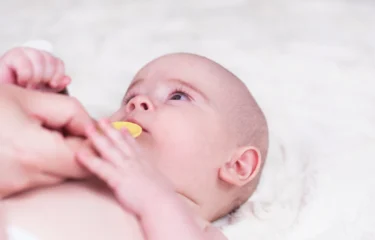
Introduce regular, age-appropriate meals and snacks, along with probiotics (only if recommended by a paediatrician) to support healthy bowel movements.

Persistent green stools with other symptoms may signal an infection or digestive problem. Therefore, in such cases, seek medical advice promptly2.
Also Read: Colic in Babies: Meaning, Symptoms, Causes, and Effective Treatments
After birth, medical staff monitor your baby’s first urination and bowel movement. The first stools, called meconium, are dark green or black and very sticky. If your baby has not passed meconium within 48 hours, further evaluation is needed to check for possible bowel issues3.
While green baby poop is usually harmless, you should consult a doctor if you notice persistent changes accompanied by diarrhoea, blood in the stool, worms in stools, pale or grey-coloured stool, or other unusual symptoms.
Also Read: Why Your Baby Isn’t Sleeping and How to Help Them Sleep Through the Night
Green stool in infants and children is usually harmless and often linked to diet, feeding patterns, or the speed of digestion. Fortunately, in most cases, it does not require treatment. However, persistent changes, blood in the stool, pale or grey stools, or other warning signs should prompt a medical evaluation.
Remember, supporting healthy digestion through proper hydration, a balanced diet, and careful monitoring can help maintain your child’s digestive health.
Also Read: Oral Thrush in Babies: Why It Happens and How to Manage It Safely at Home
Sudden changes in frequency or consistency may indicate a digestive issue. Therefore, even if the stool is green, parents should pay attention to how often their baby poops4.
Yes, occasionally green stools may appear frothy or contain mucus3. This might often be due to minor digestive upset or dietary reactions. Consult your doctor if this occurs consistently.
Yes, when babies begin solid foods around 6 months, stools can turn darker green or change in texture. This is usually normal2.
Yes, an imbalance in gut flora, especially after antibiotics, can cause green or unusual-coloured stools5. In such cases, probiotics may help (only if recommended by a paediatrician).
Iron drops or certain vitamin supplements can temporarily turn stools green5. This is generally harmless unless accompanied by other symptoms.
Disclaimer: The information provided here is for educational/awareness purposes only and is not intended to be a substitute for medical treatment by a healthcare professional and should not be relied upon to diagnose or treat any medical condition. The reader should consult a registered medical practitioner to determine the appropriateness of the information and before consuming any medication. PharmEasy does not provide any guarantee or warranty (express or implied) regarding the accuracy, adequacy, completeness, legality, reliability or usefulness of the information; and disclaims any liability arising thereof.
Links and product recommendations in the information provided here are advertisements of third-party products available on the website. PharmEasy does not make any representation on the accuracy or suitability of such products/services. Advertisements do not influence the editorial decisions or content. The information in this blog is subject to change without notice. The authors and administrators reserve the right to modify, add, or remove content without notification. It is your responsibility to review this disclaimer regularly for any changes.
Comments

Leave your comment...
You may also like
Comments